Batumi tragedy: the city mourns the dead, assesses condition of residential buildings
October 8 Batumi residential building collapse
Batumi tragedy – house 13 on May 26 street in Batumi, where nine people died in the collapse of an entrance, is still bound by a yellow tape. The rescue service is clearing the area from debris.
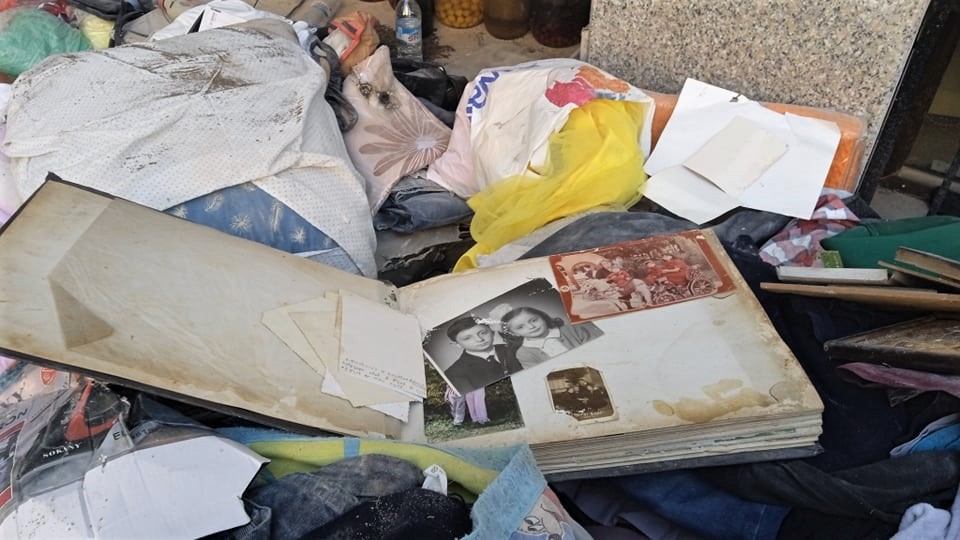
The flow of people on the street has not stopped for the last two days. People come and leave burning candles, flowers and soft toys on the fence near the ruins.
The relatives of the victims also come to the destroyed house. They collect what remains of their belongings in the rubble.
No one lives in the collapsed building and the adjacent houses now. Out of 23 families, someone moved to their relatives, someone was accommodated in a hotel by the Batumi mayor’s office.
Their homes are now being examined. It is prohibited to return to these buildings until the final conclusion of the special services is issued.
In connection with the collapse of the building, three people were detained – the owner of the first floor and two workers whom he hired for repairs. All three are in pre-trial detention. They are accused of improper and unauthorized work.
The collapse of a residential building in the center of Batumi caused fear among the population of the city. According to the local newspaper Batumelebi, calls to the inspection service of Batumi have not been interrupted for the last three days. People are asking for an inspection of their homes.
Fear has arisen in other cities of Georgia, including Tbilisi, where a boom in various outbuildings is occurring.
During a visit to Batumi last week, Interior Minister Vakhtang Gomelauri said that the problem of extensions exists throughout Georgia, and “I do not know what to do about it, what the government should do about it”.
- “I am so angry I can’t breathe.” Georgia: stories of people injured at work
- Photos and stories about urban decay in Georgia
- Three arrested, 8 died following residential building collapse in Batumi
Who died
Entrance to the five-storey residential building N13 on the street. May 26 collapsed on October 8 at about 11:30. Ten people were in the ruins including three children.
Only one person out of ten survived – a 37-year-old man. He is now in the hospital. The doctors at the Medical Center clinic say that his condition is serious, but already stable. He was removed from the ventilator.
According to local residents, if it were not for the working day, there would have been more victims.
The four dead are members of the Davladze family. Ramaz Davladze lost his wife – 35-year-old Inga Mekeidze, two small children and brother – Nugzar Davladze. He and his middle son survived by accident – the son was in kindergarten at that time, and he was at work.
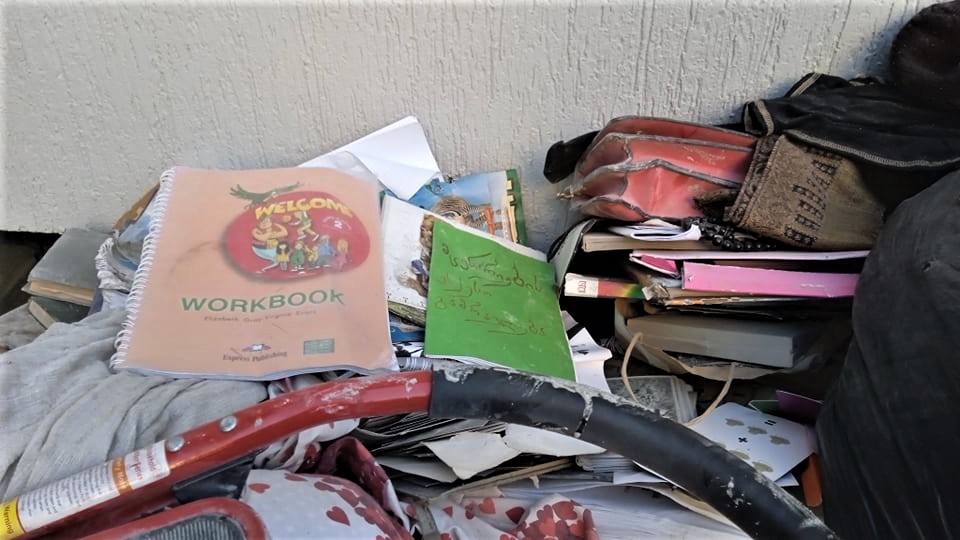
Inga was the first person rescuers rescued from the rubble after several hours of rescue work. But after that, her heart stopped four times. The doctors were unable to save her.
“Her heart stopped shortly after being rescued from the rubble, but she was taken out of this state. Then she asked about the children, she was told that they survived. But when she found out everything, her heart stopped again”, said Lia Kaspelashvili, who lives next door to the destroyed house.
After many hours of work, rescuers pulled out the bodies of the children of Inga from under the rubble – one-year-old Erekle and nine-year-old Anastasia.
Brothers Ramaz and Nugzar Davladze were born in this house, in this district of Batumi.
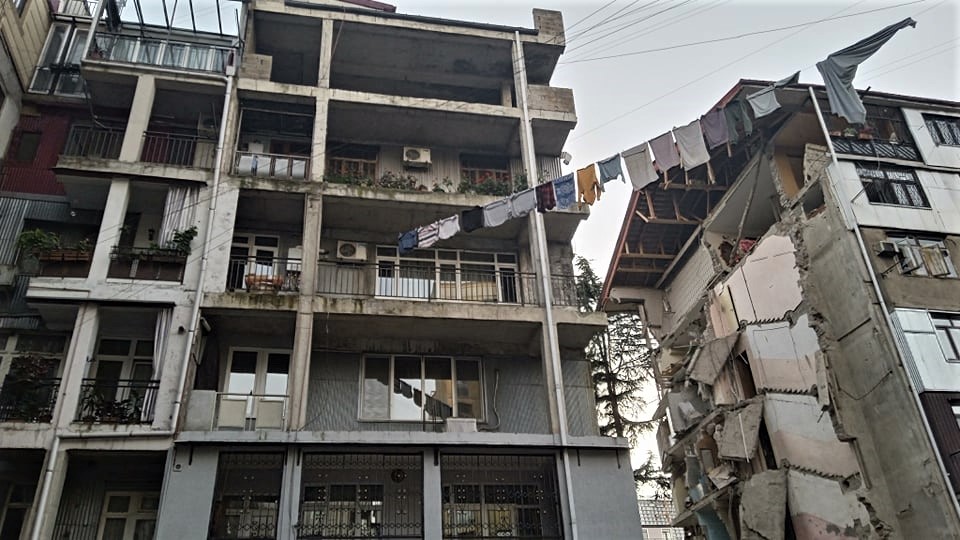
“They were orphan brothers, good children, they grew up here. Ramaz worked as a supplier in a clinic. He was lucky, he met a good wife, he had a good family. This orphan guy stood firm on his feet, he was crazy about his wife and children. And when everything was fine with him, when he found a job, this terrible tragedy happened. His brother Nugzar, who died, lived abroad. He achieved everything with his work, knowledge, made a life for himself. He arrived a week ago and was visiting his brother. He was found dead hugging his nephews”, Lia Kaspelashvili told us.
Leah is an art teacher who works at the Andamati studio, where children learn to paint. Every Monday and Wednesday, 12-year-old Datuna Shomakhia, “a boy with beautiful eyes and a special way of speaking,” attended her class.
Datuna also lived at No. 13, 26 May Street, on the third floor, with his parents and brother. During the tragedy, his brother was at school, and his father was at the store.
Datuna and his mother Maya Todua were the last rescuers found in the ruins.
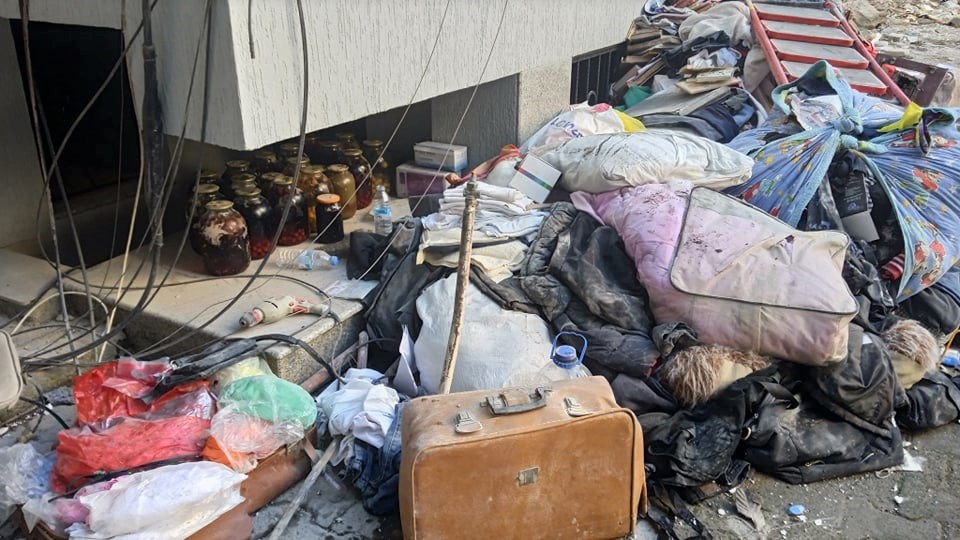
“I raised him from the age of seven. The most talented child with big eyes. He always said that drawing was his favorite lesson”, Leah tells us.
In recent days, Datuna’s drawings have been circulating on social media. In one of his last drawings, a mother and son walk together on a railway track.

The next day after the collapse of the entrance, after about 30 hours of work, rescuers found the last victim, 59-year-old Dzhemal Bauzhadze, among the concrete structures.
Jemal had a friend in this building. That morning he came to see him for coffee.
“When he entered, the walls collapsed”, said his sister Nargiz Bauzhadze, who until the last minute did not lose hope of saving her brother.
“We heard the sound of destruction”, the neighbors say.
26 May Street is located at the very center of Batumi. Here, Soviet-built houses stand side by side.
At the beginning of the street is the Batumi Maternity Hospital. High-quality hotels – “Sheraton” and “Hilton” are located 800 meters from the destroyed house.
“I walked by this house 15 minutes before the collapse. I don’t remember the sounds that day, in the previous days I noticed that there was a renovation. There are renovations everywhere in Batumi, everywhere they demolish and build something, so I didn’t pay attention to it”, says Miranda Baghdadishvili, who lives on the same street opposite.
On the ground floor in Miranda’s house there are also commercial premises – a salon, grocery stores, a pharmacy. The hosts also use basements:
“However, the owners of our basements and retail space live in the same building, so they didn’t destroy much”, she says.
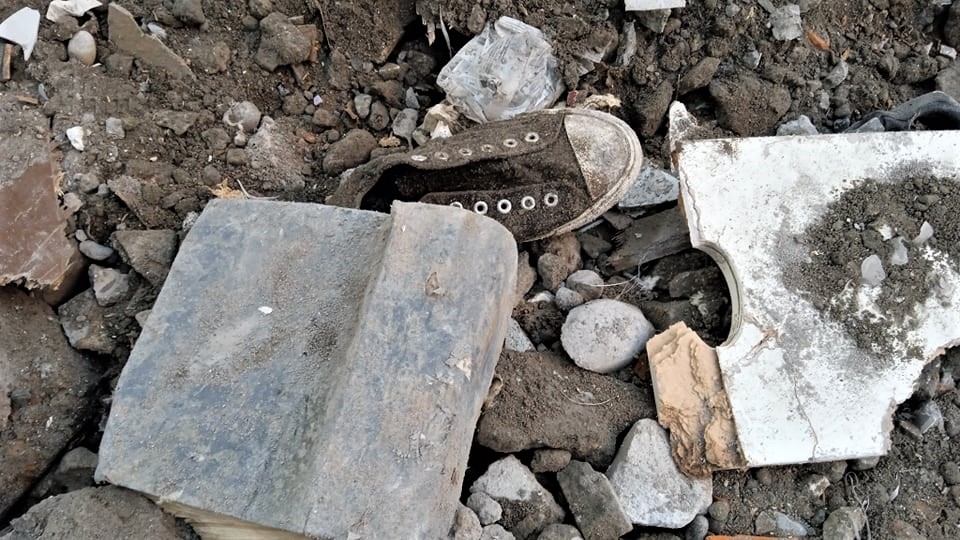
Zhuzhuna Baramidze lived in a three-room apartment next to the collapsed staircase. According to her, a part of this building collapsed, where there were one- and two-room apartments.
A young man, Sergo, was killed on its floor. She herself was not at home that day – she and her husband went to see a doctor. Now she looks from the yard at the destroyed wall of her apartment on the fifth floor, from where the washing machine is visible.
“When the renovation was going on, I heard a noise, I even approached and looked, but I don’t know what they were doing there. If the government gives permission for the project, what should I say?! I don’t know whether this person had permission. I leave the house in the morning, I go in the evening. And then I came and saw such a situation”.
What happened on the May 26 street
The first floor of the entrance, from where noise had been heard in recent days, belonged to Zaur Budatov. As local residents told JAMnews, Budatov is the manager of one of the casinos in Batumi, about a month ago he bought this house.
According to the state register, Budatov owned a 200 square meter apartment and a small basement there.
The register shows that Budatov planned to expand the house – on October 4 he applied to the national agency of the public register with a request to combine the basement and the apartment. However, he did not seem to be waiting for an answer – work began before he received this permission.
According to Batumelebi, the national public register agency discovered the problem on October 8, the day the house collapsed, and stopped production, citing a lack of sufficient documents. The main reason is the lack of a blueprint for the basement and floor.
By the time permission was denied, the house had already collapsed.
Eyewitnesses say that construction work was carried out at this address, against which they protested, because “the whole house was shaking”.
Sources also told Batumelebi that a large mass of land was taken out of the basement and that in the basement the supporting structures of the building were removed, which led to its destruction.
“In the evening, when the light was on, I saw that the inside [of the building frame] was empty. I was amazed at how they did it. Apparently he didn’t really have the permission of the mayor’s office. He did everything on his own and on the sly. He locked himself in his square like a hole and did not take anyone’s safety into account”, says Lia Kaspelashvili.
Leah says that such works in Batumi are not surprising, the city is full of similar extensions and rebuilt buildings. And it continues to this day.
Zaur Budatov and the workers he hired were detained. The defendants were charged for violation of safety rules during construction work, which resulted in the death of people.
According to the materials of the case, the craftsmen carried out repair work at the direction of the owner and in gross violation of safety rules. The defendants dismantled both non-bearing and load-bearing structures (walls), thereby violating the strength and stability of the residential building, which led to the destruction of the seven-story building.
If convicted, they face 2-5 years in prison.
Budatov himself denies the accusations, stating that he did not remove either the load-bearing walls or the earth from the basement during the work.
What fate awaits the residents of the destroyed house
The buildings adjacent to the collapsed building on 26 May Street are now being examined.
The Batumi City Hall says that until the final decision is made, the return of citizens to nearby buildings is prohibited. “The entrances are controlled by the police”, the mayor’s office said.
The Achara government says that families affected by the collapse will be provided with apartments and compensation for their improvement.
The families of those killed in the tragedy were allocated 90,000 lari (about 28,000 dollars) from the reserve fund of the government of the autonomy.
Residents of Batumi have long complained that their city has become like an urban hell.
High-rise concrete buildings grow like mushrooms on all streets, and the sea is seen less and less from the beloved Batumi courtyards.
Local media often reports that Batumi does not have a development plan. The problem is not only in new buildings, the city is flooded with illegal buildings, and chaotic unauthorized extensions are also dangerous, to which the municipal supervisory services do not react.
In recent years, another new trend has emerged in Batumi – the demolition of the first floors and their transformation into commercial premises.
“They dig under all the houses. They work at such a time that you get up in the morning, and the first floor is already gutted, and then what’s the point of protesting?”, Nargiz Bauzhadze says.
According to the head of the Batumi city inspection, Archil Kontselidze, several dozen messages are received by the service every day, citizens are asking to inspect their homes.
Despite this increased demand, the Office of Inspectors has no plans to add staff. The state does not seem to have a plan yet.
“Unfortunately, the problem of outbuildings is a misfortune of the nineties, both in Batumi and Tbilisi. We have a big problem not only in Batumi, but throughout the country”, said Georgian Interior Minister Vakhtang Gomelauri during his visit to Batumi on October 9.


















